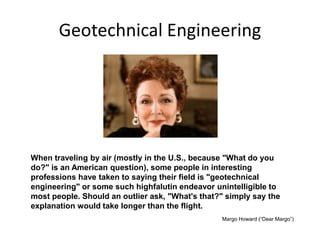Getting The Geotheta To Work
Table of ContentsThe Definitive Guide for Geotheta7 Simple Techniques For GeothetaThe Best Guide To GeothetaGeotheta Things To Know Before You Get ThisSome Known Facts About Geotheta.

They conduct site examinations, accumulate samples, perform lab examinations, and analyze information to assess the suitability of the ground for construction tasks - Consulting Engineers. Based on their searchings for, geotechnical designers give suggestions for foundation style, slope security, retaining frameworks, and mitigation of geotechnical hazards. They work together with other specialists, such as engineers, structural designers, and construction groups, to ensure that geotechnical considerations are integrated right into the overall project layout and application
By analyzing the behavior and residential or commercial properties of soil and rock, they can identify possible geotechnical dangers such as landslides, dirt negotiation, or incline instability. Their know-how helps stop failures or accidents that can threaten lives and residential property. Right here are some detailed obligations and duties of a geotechnical engineer: Site Examination: Geotechnical designers conduct website examinations to collect information on subsurface problems.
They interpret the data to comprehend the residential properties and behavior of the dirt and rock, including their strength, leaks in the structure, compaction features, and groundwater problems. Geotechnical Analysis and Style: Geotechnical engineers evaluate the information accumulated during website examinations to evaluate the security and viability of the website for construction projects. They carry out geotechnical computations and modeling to evaluate variables such as birthing capability, settlement, slope security, lateral planet pressures, and groundwater flow.
Not known Details About Geotheta
Foundation Layout: Geotechnical designers play a critical duty in creating foundations that can safely sustain the designated framework. They assess the soil conditions and tons requirements to figure out the proper structure kind, such as superficial structures (e.g., footings), deep foundations (e.g (https://geotheta.jimdosite.com/)., piles), or specialized techniques like dirt renovation. They think about variables such as negotiation limitations, bearing ability, and soil-structure communication to establish optimal structure styles
They examine construction plans, display website tasks, and perform area assessments to validate that the design recommendations are followed. If unexpected geotechnical problems occur, they analyze the situation and provide referrals for remediation or modifications to the layout. Threat Analysis and Mitigation: Geotechnical engineers analyze geotechnical dangers and risks connected with the task website, such as landslides, liquefaction, or dirt erosion.

Cooperation and Communication: Geotechnical engineers function very closely with various other specialists associated with a job, such as designers, architectural engineers, and building and construction teams. Efficient interaction and cooperation are important to integrate geotechnical factors to consider into the overall project style and building and construction process. Geotechnical engineers offer technical know-how, answer inquiries, and ensure that geotechnical needs are satisfied.
Everything about Geotheta
Below are some kinds of geotechnical engineers: Structure Designer: Foundation engineers concentrate on making and analyzing structures for frameworks. They evaluate the soil conditions, load needs, and site qualities to establish one of the most appropriate structure type and style, such as superficial foundations, deep foundations, or specialized techniques like heap foundations.
They examine the variables influencing incline stability, such as dirt residential properties, groundwater problems, and incline geometry, and establish approaches to stop incline failures and alleviate dangers. Earthquake Engineer: Quake engineers specialize in evaluating and developing frameworks to hold up against seismic forces. They analyze the seismic threat of a website, assess soil liquefaction capacity, and develop seismic layout requirements to ensure the security and durability of structures throughout earthquakes.
They carry out field testing, gather samples, and analyze the gathered information to characterize the dirt residential properties, geologic formations, and groundwater problems at a website. Geotechnical Instrumentation Designer: Geotechnical instrumentation engineers concentrate on tracking and measuring the actions of dirt, rock, and structures. They install and keep instrumentation systems that keep an eye on variables such as dirt settlement, groundwater levels, incline motions, and structural displacements to evaluate performance and offer very early cautions of possible concerns.
All About Geotheta
They perform tests such as triaxial tests, consolidation tests, direct shear examinations, and leaks in the structure tests to collect information for geotechnical analysis and style. Geosynthetics Designer: Geosynthetics engineers concentrate on the design and application of geosynthetic products, such as geotextiles, geogrids, and geomembranes. They utilize these materials to improve soil security, reinforce slopes, provide water drainage solutions, and control disintegration.
They have a tendency to be investigatory individuals, which indicates they're intellectual, introspective, and inquisitive. They are curious, systematic, reasonable, analytical, and rational. Some of them are likewise social, meaning they're kind, charitable, participating, individual, caring, practical, compassionate, sensible, and pleasant. Does this seem like you? Take our cost-free career examination to discover out if geotechnical designer is one of your top job suits.
In the office environment, geotechnical engineers make use of specialized software application tools to perform computations, produce layouts, and evaluate information. They prepare reports, testimonial project specs, interact with clients and staff member, and coordinate task tasks. The workplace setup gives a helpful environment for research, evaluation, and partnership with other professionals associated with the job.
More About Geotheta
They regularly see job sites to carry out site examinations, examine geotechnical problems, and collect data for evaluation. These sees entail traveling to different areas, occasionally in remote or difficult surfaces. Geotechnical designers might carry out soil tasting, conduct tests, and screen building tasks to make sure that the geotechnical elements of the job are being carried out appropriately.
Geotechnical engineers additionally work in specialized geotechnical research laboratories. Geotechnical research laboratory engineers work extensively in these atmospheres, taking care of screening tools, operating tools, and recording information.